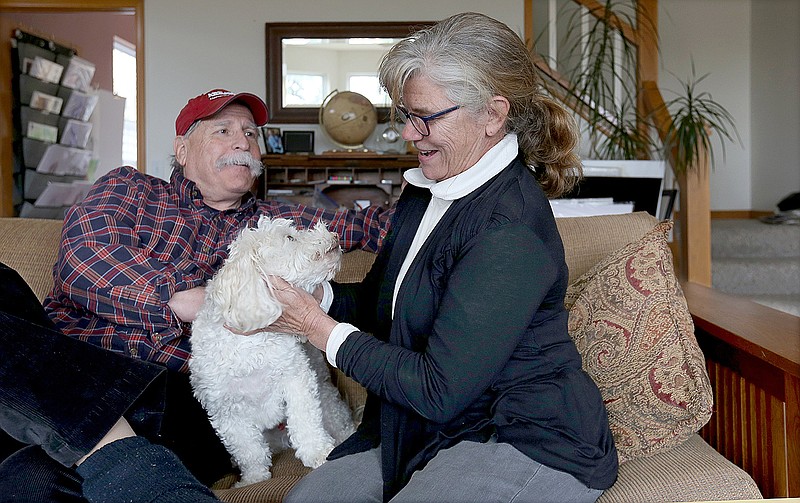Thieves and looters normally steal what they can carry, but Russian occupiers in Ukraine steal everything, said Samuel Totten, a University of Arkansas professor emeritus.
"The thing I keep hearing over and over is how the Russians move in and assume they own everything," Totten said of his interviews with Ukrainians fleeing the fighting during Russia's invasion. "In one case, the military went in and sold the town's police cars. They sold one for the price of 10 burgers. I couldn't believe it. I asked, 'For the price of 10 burgers like you'd buy at McDonald's?' It's so outlandish it's hard to believe."
"The Russian military sets up block posts" in towns they occupy, he said. Checkpoints are common in military occupations, but in the Russian occupation, "you're not allowed to leave or enter an area without a pretty large bribe."
Totten is a trained field researcher. The U.S. State Department recruited him to research genocide and war crimes. He studied genocide firsthand in Sudan's Darfur region and Chad for nearly 40 years. He's a published author on genocide who has served as a co-editor of Genocide Studies and Prevention, the official journal of the International Association of Genocide Scholars.
The 74-year-old retiree traveled from his lakeside home east of Springdale to Lviv, a city in western Ukraine, on his own to take statements from people fleeing the invasion. He arrived in Lviv on March 18, he said.
"I came to Ukraine as a trained outsider," Totten said. "I want to conduct and collect interviews and hand those records over to the International Criminal Court."
The statements Totten takes -- a process taking hours with each interviewee -- will add to the evidence amassed by the court from others like him and the court's own investigators, he said. Those witness statements will help sort fact from fiction, cross-referenced with statements taken from other investigators and other evidence, he said.
Ukrainians are astonished at what activists and nongovernmental organizations have done for them, Totten said.
Totten is one of many investigators who came to Ukraine on their own time and expense, he said. His work earlier on the State Department's Darfur Atrocities Documentation Project "never saw the light of day. It was done for the State Department's internal use to decide if genocide had been committed," he said.
The International Criminal Court in The Hague, Netherlands, was created by treaty. Started in 2002, the court is a permanent body to investigate and, when warranted, try cases of genocide and war crimes.
The court issued an arrest warrant for Russian President Vladimir Putin on March 17 for war crimes, specifically allegations Russia has and is continuing to kidnap Ukrainian children for adoption in Russia. The court also indicted Maria Alekseyevna Lvova-Belova, commissioner for children's rights in Putin's government. Totten said interviewing parents of a taken child is one of his priorities but he hasn't interviewed any yet. He planned to remain in Lviv until today and may return, he said.
The Russian Federation released its 42-page statement of foreign policy doctrine Friday claiming accusations of war crimes are anti-Russian propaganda, part of a coordinated campaign to "weaken Russia in every possible way," as federation foreign minister Sergei Lavrov said in releasing the document. The doctrine statement accuses countries led by the United States of exploiting the war in Ukraine to form a coalition against Russia.
The task of collecting evidence has not been easy, particularly in nailing down specific dates of when the atrocities they described occurred, Totten said.
"I've never encountered so many confused people so quickly," Totten said of his time in Ukraine, during a interview Tuesday.
"People in Darfur never had running water or electricity, so I'm thinking the shock to Ukrainians of losing those things right away is part of it," Totten said. Another aspect is the "absolutely savage and sadistic" treatment by the invaders.
"One of the first things the Russians do when they come into a town is set up a 'basement,' a euphemism for a torture center," interviewees tell him, Totten said. "Ukrainians who commit certain actions such as protests go there."
"In one town, the Russians came into a building, went to a balcony and started throwing grenades" according to one witness account, he said. Those statements and others should be investigated by the International Criminal Court and corroborated if possible, he said.
Totten's interview sessions last 2½ to three hours, he said.
"The most I've interviewed in a day is three people," he said. Local assistance is both generously offered and invaluable, he said. He traveled by air to Poland and by bus to Ukraine.
Putin insists in public statements Ukraine is part of Russia that broke away after the collapse of the Soviet Union, that it oppresses ethnic Russian and Russian-speakers in Ukraine and persecutes the Russian Orthodox Church in Ukraine. Asked whether Ukraine is Russian, Totten laughed.
"That's not the way the Ukrainians see it," he said.
The pride Ukrainians feel in their country and its resistance to the invasion is tangible, Totten said.
"I interviewed one man who had a mortar shell blow up right in front of him," he said. "He has a colostomy, an arm broken in different places and wearing some sort of corset" that is a medical brace. "I thought he looked clinically depressed, but as I interviewed him he kept saying he was doing fine."

